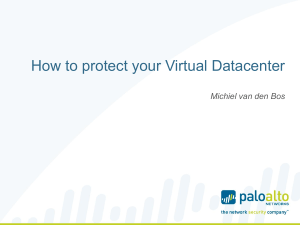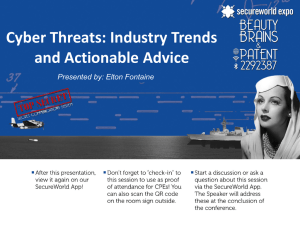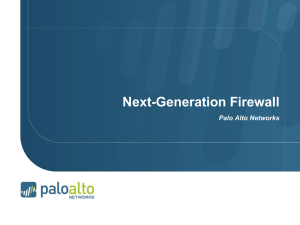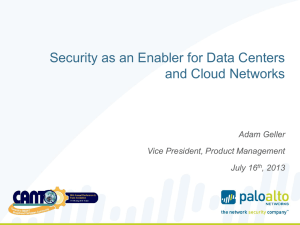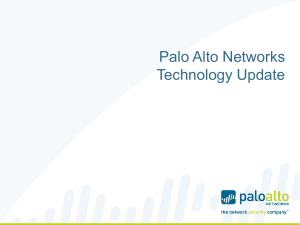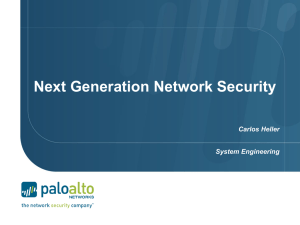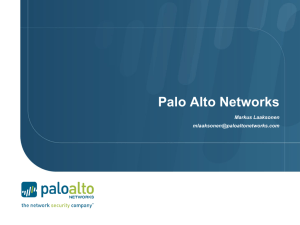Ryan Olson Director of Threat Intelligence October, 2014
advertisement
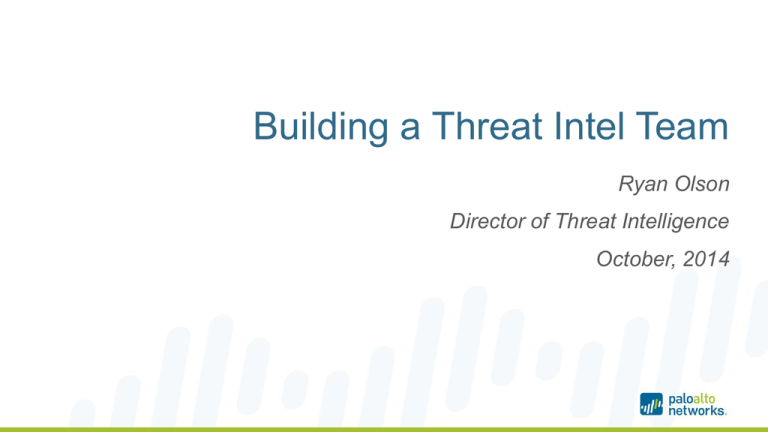
Building a Threat Intel Team Ryan Olson Director of Threat Intelligence October, 2014 Quick Survey How many of you have threat intelligence teams? How many of you use threat intelligence as part of your security operation? 2 | ©2014, Palo Alto Networks. Confidential and Proprietary. Agenda Who Am I Me + Unit 42 What is Threat Intelligence Role and Value How to Intelligence Cycle Building the Team 3 | ©2014, Palo Alto Networks. Confidential and Proprietary. Who Head of Unit 42 – Palo Alto Networks Threat Intelligence Team Formerly Sr. Manager with Verisign’s iDefense Threat Intelligence service. Specialize in Cyber Crime and Espionage Mission: Analyze the data available to Palo Alto Networks to identify adversaries, their motivations and resources to better understand the threats our customers face. 4 | ©2014, Palo Alto Networks. Confidential and Proprietary. CEO CSO What is Threat Intelligence? “Evidence-based knowledge, including context, mechanisms, indicators, implications and actionable advice, about an existing or emerging menace or hazard to assets that can be used to inform decisions regarding the subject's response to that menace or hazard.” - Rob McMillan - Gartner 5 | ©2014, Palo Alto Networks. Confidential and Proprietary. 212.83.131.214 is Bad X ✓ On May 6, 2014, 212.83.131.214 hosted a command and control server for the NetWire RAT on TCP port 3360 in association with an attack from Nigerian cyber criminals… What can a Threat Intel do for your company? Supply Context • Resources and Motivations • Targeting and History 6 | ©2014, Palo Alto Networks. Confidential and Proprietary. Identify Risks • High Priority Targets • Resource Allocation Support Incident Response • Tactics, Tools and Procedures • Indicators Intelligence Team Considerations Customer: Who’s paying the bills? Consumer: Who’s reading/processing the products? Consumers Products: How do you deliver the intelligence? Operations: How do you collect information and turn it into intelligence? Operations Customer 7 | ©2014, Palo Alto Networks. Confidential and Proprietary. Products Customer and Consumers Customer Set’s high level priorities Understand capabilities/limitations Attribution, Counter Intel, Brute Squad Consumer Uses intel products InfoSec/CSIRT Legal/Finance/CorpComms Marketing/Sales 8 | ©2014, Palo Alto Networks. Confidential and Proprietary. Products Periodicals Summaries and trends. Alerts Active events requiring action Requests for Information (RFI) Specific needs of a consumer Data Feeds Actionable, including context. 9 | ©2014, Palo Alto Networks. Confidential and Proprietary. The Intelligence Cycle • Well-established • Widely use by civilian/military intelligence and law enforcement Direction Dissemination Collection • Cycle includes feedback Analysis 10 | ©2014, Palo Alto Networks. Confidential and Proprietary. Processing The Intelligence Cycle - Direction • Customer sets high level priorities and mission • “Support CSIRT with intelligence on adversaries attacking our organization.” • Refined to series of questions to pursue. • Direction Dissemination Collection Understand limitations • Defines data and capabilities necessary to accomplish mission. 11 | ©2014, Palo Alto Networks. Confidential and Proprietary. Analysis Processing The Intelligence Cycle - Collection • Collect information from sources necessary to meet requirements Direction • Internal Systems • • SIEM, Log Management, Org Charts IPS/NGFW/Sandbox Dissemination Collection • External Data • • • • Open Source Paid Intelligence Feeds Industry Groups Gap Analysis 12 | ©2014, Palo Alto Networks. Confidential and Proprietary. Analysis Processing The Intelligence Cycle - Processing Use technology to convert raw information into analyst workflow Many sources, many formats. Automate as much as possible. Direction Dissemination Analysis 13 | ©2014, Palo Alto Networks. Confidential and Proprietary. Collection Processing The Intelligence Cycle - Analysis • Where information becomes intelligence. Direction • Clear away noise, identify what’s important, support decision makers. • Have the right capabilities • • • • Dissemination Collection Network Malware Forensics Geo-political Analysis 14 | ©2014, Palo Alto Networks. Confidential and Proprietary. Processing The Intelligence Cycle - Dissemination • Keep consumer in mind. • Clear and concise. • Answer isn’t always simple, but should be comprehensible. • Dissemination Collection Timely delivery • • Direction Before it’s useless Consumable (Machine or Human) 15 | ©2014, Palo Alto Networks. Confidential and Proprietary. Analysis Processing The Intelligence Cycle – Direction (Again) • What did you learn? • Did the product meet requirements? • Do we need new sources/capabilities? Direction Dissemination Collection • Do we need to investigate something new? Analysis 16 | ©2014, Palo Alto Networks. Confidential and Proprietary. Processing Before You Start Do you have the following under control? Incident Response Patching Network Visibility Identify your customer and mission. Identify your consumers (be creative) Evaluate existing staff Institutional knowledge is important You probably don’t have everything you need. 17 | ©2014, Palo Alto Networks. Confidential and Proprietary. Resources Rick Holland: “Five Steps To Build An Effective Threat Intelligence Capability” Martin Petersen: “What I Learned in 40 Years of Doing Intelligence Analysis for US Foreign Policymakers” Unit 42 – White papers, blog, tools. • • • http://www.coresecurity.com/system/files/attachments/2013/04/RickHollandFiveStepstoBuild.pdf https://www.cia.gov/library/center-for-the-study-of-intelligence/csi-publications/csistudies/studies/vol.-55-no.-1/what-i-learned-in-40-years-of-doing-intelligence-analysis-for-usforeign-policymakers.html https://paloaltonetworks.com/threat-research.html 18 | ©2014, Palo Alto Networks. Confidential and Proprietary. 19 | ©2014, Palo Alto Networks. Confidential and Proprietary.
